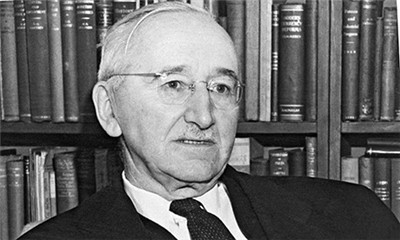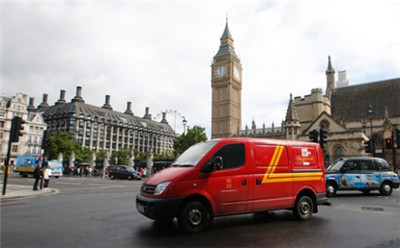(单词翻译:单击)
Millions did buy shares. Most Britons, bemused by the process, assumed the main reason for privatisation was to raise cash for a desperate government. Harold Macmillan, who before his death provided a snarky Wodehousian commentary from the wings on the work of the grocer's daughter, observed in an often paraphrased line: "The sale of assets is common with individuals and states when they run into financial difficulties. First, all the Georgian silver goes, and then all that nice furniture that used to be in the saloon. Then the Canalettos go."
数百万人确实购买了股票。大多数英国人对这一进程感到困惑,认为私有化的主要原因是绝望的政府想募集资金。麦克米兰在去逝前在一部描写零售商女儿的作品中从侧面辛辣地对这种局面提出讽刺,字里行间总会提到“国家遭遇财政困难时出卖资产的行为与个人毫无区别。首先会变卖所有的乔治亚银盘,然后是沙龙里所有精美的家居,后来连卡纳莱托的作品也卖了。”
Another leal privatiser, Nigel Lawson, a minister in the Thatcher government from the beginning almost to the end, dismissed the idea that the government cared about the price it was getting for selling off the family silver. Having many ordinary people owning shares, he writes in his memoirs, was the point. "The prime motives for privatisation were not Exchequer gain," he declares, "but an ideological belief in free markets and a wider distribution of private ownership of property."
另一位忠实的私有化支持者,从始至终就职于撒切尔政府的内阁大臣——劳森一直反对政府只关注于被出售资产的价格。看到很多普通民众拥有了股票,他在回忆录中写道,关键问题是“私有化的基本目的并不是充实国库,”他宣称“而是要实现自由市场理想论以及私有财产能够被更广泛的分配。”
Neither Walters nor Lawson, nor other allies like Keith Joseph, the ex-communist Alfred Sherman or Nicholas Ridley, would have been able to implement their ideas without Thatcher herself, her extraordinary sense of the way the political wind was blowing, her conviction of her own rectitude, and the stamina and persistence with which she was able to go on insisting on something until her opponents in government gave in. Hers was a different emphasis to Walters, who saw the curbing of "bloody-minded trades unions" as a useful side effect of privatisation. For Thatcher, privatisation, in the beginning at least, was simply one of many weapons to use in her battle against the unions, which was, in turn, a single episode in her war to exterminate socialism, to be fought in one unbroken front from Orgreave Colliery to Andrei Sakharov's place of exile in Gorky. Her great political inspiration, apart from her father, was the Austrian economist Friedrich Hayek's 1944 book, The Road to Serfdom, written in Cambridge during the war. Hayek was regarded as an able economist; he eventually won a Nobel prize for it. But The Road to Serfdom isn't an economics book. It's a book about society, the recent past and human nature that bears the same relation to sociology, history and psychology as Ayn Rand's Atlas Shrugged bears to literature. It is devoted to the idea that Winston Churchill later nodded to, catastrophically for him, in the 1945 election campaign, when he said Labour would have to fall back on "some form of Gestapo" to implement its welfare and nationalisation programme. Churchill was thrown out of office, and Labour won a huge majority.
没有撒切尔,无论是沃特思或劳森,再或是约瑟夫、以及前共产主义者舍曼或雷德利都不可能实现他们的想法。撒切尔非凡的政治思想扩展开来,他坚信自己的正确性,并且能够持久坚持直到政府中的对手放弃。她与沃特思强调的重点不同,不认为建立“铁血的行业工会”是私有化有用的副产品。对于撒切尔而言,私有化只是在她与工会斗争过程中众多有用的武器之一,至少最初她是这么认为。反过来,这也是她根除社会主义的斗争中的一段插曲。从柯丽瑞到萨克洛夫的流放地——高尔基,她一直战斗在一个不可攻破的前沿阵地。她伟大的政治灵感除了部分源于她的父亲之外,还来自一部奥地利经济学者海雅克的一本书——农奴制之路,该书是海雅克1944年战争期间在剑桥所著。海雅克被公认为一位杰出的经济学家,最终获得了诺奖。但《农奴制之路》并非一部经济学著作,而是关于社会,过去以及人类本性,其对社会、历史和人们心理的分析相当于施拉格对文学做出的贡献。这本书贡献的思想之后收到丘吉尔的肯定,但非常不幸,在1945年大选时,丘吉尔称工党注定会依赖于“某些盖世太保式的措施”才能保证国民福利和国有化。然而丘吉尔却被赶下台,工党赢得了大多数。
The Road to Serfdom claims that socialism inevitably leads to communism, and that communism and Nazi-style fascism are one and the same. The tie that links Stalin's USSR and Hitler's Germany, in Hayek's view, is the centrally planned economy – as he portrays it, the attempt by a single central bureaucracy to direct all human life, to determine all human needs in advance and organise provision, limiting each to their rationed dole and their allotted task. Such a bureaucracy will no more tolerate dissent and deviation than the engineers tending a vast production line will accept a pebble jamming the gears. Confusingly, Hayek denies he is a pure libertarian, and declares the free market must have rules; he also says it is acceptable for government to "provide an extensive system of social services". Yet this is in contradiction to his main message, which is that there can be no mixture of state planning and free market competition. To him they are mutually exclusive. "By the time Hitler came to power, liberalism was dead in Germany," he writes. "And it was socialism that had killed it." Even to try to make socialism work, according to Hayek, is dangerous: "in the democracies the majority of people still believe that socialism and freedom can be combined. They do not realise that democratic socialism, the great utopia of the last few generations, is not only unachievable, but that to strive for it produces something utterly different – the very destruction of freedom itself."
《农奴制之路》宣称社会主义不可避免的要走向共产主义,并且共产主义与纳粹法西斯本质相同。按照海雅克的观点,斯大林的苏联和希特勒的德国的相同点在于都是中央计划经济。正如他说描述的,由唯一的中央集权的官僚主义左右所有人的生活,提前确定所有人的需求,并组织分配,给每个人限定份额并且分配工作。这种官僚主义不会容忍不同观点,趋向于建立一种只允许少量误差的庞大生产线。令人困惑的是,海雅克否认自己是纯粹自由主义者,并且认为自由市场必须建立规则。他还宣称,政府可以“建立一套社会服务分支系统”。但这与他的主要观点相矛盾,即不应该存在国有计划经济和自由市场竞争的混合体。在他认为,二者是互相排斥的。“当希特勒上台后,德国的自由主义灭亡了。”他写道“是社会主义消灭了它。”根据海雅克的观点,即使是尝试着建立社会服务系统也是危险的。“在民主制度下,绝大多数人仍旧相信社会主义和自由能够共存。他们不会建立起民主的社会主义,这种过去几代人曾尝试过的大乌托邦,不仅不能实现,而且将走向完全相反的方向,将彻底摧毁民主。”

Author of "The Road to Serfdom" Friedrich Hayek, at the University of Chicago in 1960. Photograph: Bettmann/Corbis
《农奴制之路》作者海雅克,1960年在芝加哥大学。摄影:贝特曼/考比斯
Hayek was proven wrong. As in other western European countries, socialists came and went from power in Britain, introduced a welfare state and took control of large swathes of the economy without democracy and individual freedoms being threatened. The NHS was set up, council houses were built, social security was established, state education was expanded, coal, rail and steel nationalised, yet despite all the planning this required, millions of private businesses, small, medium and large, carried on merrily competing (or co-operating) with each other, flourishing or going to the wall as the market determined. Private doctors kept their clinics on Harley Street, young aristos still ruggered their way across the playing fields of Eton, the private shop windows of Harrods still blazed forth at Christmas time. Bankers and stockbrokers thronged the City, and the farmers owned their land. No one was forced by the government to live in a particular place or do a particular job. There was an argument to be made about how much tax people and businesses paid, and how much of that money government would have been better letting them choose for themselves how to spend. The argument was made, and will always be made; in the end, neither the Gestapo, nor the English Hitler, nor the English Politburo appeared, or looked like appearing.
事实证明海雅克错了。正如其他西欧国家,社会主义者离开了英国的权力核心,来到这些国家,引入建设福利国家的政策,把持大量产业,缺乏民主,并且个人的自由也受到威胁。建立了NHS、市政厅大楼、社会保障体系,推广公立教育,煤炭、铁路和钢铁产业都成为国有。然而,尽管所有这些都在计划体制下,数百万的私人产业,无论大中小型,都愉快的继续着相互之间的竞争(或合作),市场决定了他们或是繁荣或是垮塌。私人医生在哈利大街继续开办诊所;年轻的权贵们依然在伊顿公学里玩着橄榄球;圣诞时分哈罗德大街上私人商店依然灯光通明;银行家和股票经纪人们涌入城市,并且农民们依然拥有自己的土地。政府没有强迫任何人要居住在特定的地区或从事特定工作。曾有人针对一些问题展开辩论,包括:个人和企业要缴纳多少税赋,政府最好要有多少钱能让人们自己支配。这种辩论正在进行,并且将一直进行下去。最终无论是盖世太保还是英国的希特勒,还是英国的政治局都没有出现,或者仿佛要出现。
Hayek's work, that of a frightened refugee in wartime, in the blackouts and shortages of a besieged island, had been superseded by the 1970s. A better framework for understanding the Britain of the time would have been the American Daniel Bell's masterful introduction to his 1976 book The Cultural Contradictions of Capitalism, where, though he spoke in general terms, he seemed to capture the actual contemporary problems of the UK: "A system of state capitalism could easily be transformed into a corporate state … a cumbersome, bureaucratic monstrosity, wrenched in all directions by the clamour for subsidies and entitlements by various corporate and communal groups, yet gorging itself on increased governmental appropriations to become a Leviathan in its own right." Thatcher, however, never stopped seeing the world through a Hayekian prism. After she defeated the attempt by Britain's coal miners to stave off mass redundancies and pit closures by downing tools, she wrote: "What the strike's defeat established was that Britain could not be made ungovernable by the Fascist Left."
作为一名受到战争惊吓的难民,海雅克屈居在灯火管制物质缺乏并且受到围困的英国。到了70年代其作品体现的思想已经被取代。这一时期更能理解英国实际情况的是美国人贝尔,他于1976年出版了个人巨著《资本主义的文化冲突》。在按照总的说法,书中他似乎抓住了英国当时的实际问题。“国家资本主义会轻易地转变为国家企业化,一个臃肿又官僚的巨兽,在各个方面挣扎,各种企业和社会团体都在大声讨要补贴和授权,然而还要狼吞虎咽的吞下政府给予越来越多的补贴,成为拥有自主权的庞然大物。”然而,通过海雅克的角度,撒切尔从未停止过对世界形势的分析。她挫败了英国煤炭公司推迟遣散多余用工以及通过罢工关闭矿井的企图,随后写道“针对罢工斗争的胜利树立起一种观念,即英国不再是一种法西斯遗留的无政府状态。”
About 10 years ago, I began to investigate what happened after the early Thatcherite zeal took effect. I was sceptical when I began my inquiries, but I was prepared to be convinced that privatisation in these half-dozen cases had been a success. I learned that it has not. Privatisation failed to turn Britain into a nation of small shareholders. Before Thatcher came to power, almost 40% of the shares in British companies were held by individuals. By 1981, it was less than 30%. By the time she died in 2013, it had slumped to under 12%. What is significant about this is not only that Thatcher and her chancellor Nigel Lawson's vision of a shareholding democracy failed to come to pass through privatisation, but that it undermines the justification for the way the companies were taken out of public ownership.
大约10年前,我开始着手调研撒切尔早期努力的成果,何时开始调查令我有些犹豫,我本以为有六个行业的私有化已经取得成功。但事实并非如此。私有化改革并没有使英国变成一个由小股东掌控的国家。在撒切尔上台前,几乎40%的英国公司股票归个人所有。到了1981年,这一比例降低为30%。等到撒切尔去逝的2013年,进一步缩水为12%。重要的是,不仅撒切尔及其顾问劳森关于股权民主的思想没有通过私有化改革得以实现,而且改革破坏了企业脱离公有的基础。
There's no doubt that since privatisation the old nationalised industries have sacked colossal numbers of workers and brought in new technology. If efficiency is doing the same job or better with fewer workers, many of the privatised firms are more efficient. But this simply suggests some or all of the nationalised industries should have been commercialised – that is, had their subsidies shrunk and been removed from direct government control, obliging them to borrow money at commercial rates and operate in a world of market prices without making a loss. Apart from the failed attempt to encourage wider share ownership, there was no obvious reason to privatise them by floating them on the stock market and selling them to shareholders. There are many forms of private ownership. The department store chain John Lewis, an unsubsidised commercial firm in a fiercely competitive market, is owned by its employees. The Nationwide Building Society, an unsubsidised commercial firm in a fiercely competitive market, is owned by its members. The Guardian Media Group, an unsubsidised commercial firm in a fiercely competitive market, is owned by a trust set up to support its journalistic values and protect it from hostile takeover. And so on. None of the many alternatives to stock market flotation were put up for discussion by either side: it was either shareholder capitalism or the nationalised status quo.
毫无疑问,自从私有化改革以来国有行业已经遣散了很多工人,并且引入了新技术。如果较少的劳动力能够做同样的工作,很多私有企业效率会更高。但这只简单的提示了一些或者所有的国有企业,他们本应该实现商业化。这就是说,要减少对他们的补贴,并且直接脱离政府管控,迫使他们按照商业利率贷款,按照市场价格运营,不能造成损失。撇开鼓励更广泛持股的尝试遭遇失败不说,国家并没有明显的理由将这些企业私有化,使他们的股价浮动于股市之中,并且卖给个人持股者。应该由很多种形式的私有化。例如,连锁百货公司路易斯,一家没有补贴,在激烈的市场竞争中搏击的商业企业,其股权为员工所有;国家建筑协会,一家没有补贴,在激烈的市场竞争中搏击的商业企业,股权为其委员所有;卫报集团,一家没有补贴,在激烈的市场竞争中搏击的商业企业,其股权归信托基金所有,以保障其作为媒体的价值,并且防止恶意接管。
Privatisation failed to demonstrate the case made by the privatisers that private companies are always more competent than state-owned ones – that private bosses, chasing the carrot of bonuses and dodging the stick of bankruptcy, will always do better than their state-employed counterparts. Through euphemisms such as "wealth creation" and "enjoying the rewards of success" Thatcher and her allies have promoted the notion that greed on the part of a private executive elite is the chief and sufficient engine of prosperity for all. The result has been 35 years of denigration of the concept of duty and public service, as well as a squalid ideal of all work as something that shouldn't be cared about for its own sake, but only for the money it brings. The magic dust of the market was of little use to the bosses of the newly privatised Railtrack in the mid-1990s. They thought they could sack people with impunity – not just signalling and maintenance staff but expert engineers and researchers – and carry out a massive line-upgrade cheaply with the most advanced new technology. Unfortunately the people who could have told them that the new technology didn't exist were the people they had sacked. As a result, the company went bust in 2002, and had to be renationalised.
私有化并没有展示出私有化主人所实现的那种情况,包括:私有企业总比国有企业能力更强,私有老板会追逐收益,并且规避破产风险,总会被国有企业负责人做得更好。通过一些委婉的言辞,例如“创造财富”和“享受成功的回报”等,撒切尔和她的伙伴们宣传一种概念,即就一个私人管理精英而言,贪婪是首要特点,并且足以为所有人带来富足。结果造成35年来,责任感和公共服务一直受到冷遇,以及出现了一种肮脏的思想,即要为自己着想,对所有工作都不比太关心,只为金钱服务。在90年代中期,魔术般的市场笼罩并没有为新兴私有公司英国路轨公司的老板带来好处。他们认为他们解雇员工不会带来损失,不仅解雇信号维修工,而且还有动力专家和研究人员,并且可以廉价的利用最新技术进行了线路的大规模升级改造。不幸的是,能够证明新技术根本不存在的人正是他们所解雇的一批人。结果导致该公司在2002年破产,不得不重新回归国有。
A Royal Mail passes the Houses of Parliament behind it, in central London, September 12, 2013. Photograph: EDDIE KEOGH/Reuters
图文皇家邮政在伦敦市中心通过国会大厦,2013年9月12日。摄影:艾迪·基奥/路透社
Privatisation failed to make firms compete or give customers more choice – said to be the canonical virtues of privatisation. Pretty hard, you would think, to privatise water companies, when they are all monopolies, with nobody to compete with, and can't offer customers a choice – neither the choice of which supplier to use nor the choice of whether to take a service or not. And yet the English water companies were privatised, and in such a way that customers have been overcharged ever since. The privatisers loved competition, but the actual privatised competitors hate it. The competitive vision of those who designed Britain's electricity privatisation – a rumbustious, referee-supervised free-for-all between sellers and makers of electricity old and new, large and small – has degenerated into an opaque oligopoly of a handful of giant players.
太令人失望了,也许你认为英国水务公司的私有化将会变得更加规范强大,可是垄断使他们没有竞争对手,使客户无法选择服务和供应商,所以英国水务公司的民营化会多收老百姓的钱,商人喜欢竞争,但是在实际中又厌恶他。曾经有一个流氓一手推动英国电力的民营化创造竞争的假象,电力设施更换和创建失去裁判的监督就变成垄断者一个人的游戏。
The impression grows, on reading Thatcher's autobiography, that she believed the transformational effect of privatisation was such as to turn executives into self-consciously moral, patriotic, civically minded entrepreneurs like her father; as if a monopoly on water supply for several million people were a local grocery shop in a small English town in the 1940s. Privatisation, she claimed, was "the greatest shift of ownership and power away from the state to individuals and their families in any country outside the former communist bloc". The reality is that the faceless state bureaucrats of the old electricity boards have been replaced by the faceless (and better paid) private bureaucrats of the electricity companies. Not only are the privatised utilities big, remote corporations; most of them are no longer British, and no longer owned by small shareholders. Indeed electricity and water privatisation could not have failed more absolutely to foster the emergence of world-beating, innovative British companies.
读到撒切尔的自传,一种感想油然而生,她相信私有化改革能够将管理层转变为自律、爱国、谦恭的企业家,像他父亲一样。仿佛一个掌管700万人供水的垄断公司应该与40年代英国小镇上杂货店一个样。她宣称,私有化是“在共产主义国家以外的所有国家内,将归权属从国家转给个人及其家庭的最伟大变革。”事实是无耻的电力行业老董事会的国家官僚主义者被无耻的私人电力公司的私人官僚主义者(收益更多者)所替代。不仅大型实体、偏僻的企业变为私有,使他们中绝大多数不再属于英国,而且也不再由小股东掌控。事实上,电力和水利系统的私有化,完全没有培养出具有世界影响的创新性英国企业。
Most of the electricity made and sold in England is now owned by dynamic, tech-savvy companies from western Europe, a region doomed, Thatcher thought, by creeping socialism. As a direct result of the way electricity was privatised, much of it has now been renationalised – but by France, not Britain. Of the nine big English water and sewerage firms, six have achieved the seemingly impossible feat of being privatised a second time, delisted from the stock market by east Asian conglomerates or by private equity consortia. Today much of England's water industry is, it is true, in the hands of individuals and their families, but they don't use English water; they are millions of former civil servants in Canada, Australia and the Netherlands, investing, unwittingly, through their pension funds. The National Health Service is a special case. It hasn't been privatised, and the political parties vie with each other to show that it's safest in their hands.
撒切尔认为通过缓慢的社会主义进程,大多数英国电力企业现在必然由一个区域性集团即西欧的活跃的、高科技储备企业执掌。一个直接的电力企业私有化成果是目前很多企业都已经重新实现国有,但却由法国控制,而不是英国。英国九个大型水利和废物处理企业中,有六个已经完成二次私有化这一似乎不可能实现的任务,由亚洲企业或私人实体财团掌控重新上市。目前,事实上很多英国供水企业已经掌握在私人及其家族手中,但他们自己并不使用英国的水,他们是数以百万计的加拿大、澳大利亚和荷兰的前公务员,退休基金管理机构在他们不知情的情况下进行了投资。国家卫生服务行业是个特例。没有被私有化,因为政治党派互相竞争,以体现出将卫生服务行业掌握在他们手中最安全不过。
Yet it has been commercialised and repeatedly reorganised, with competition introduced, in such a way as to create a kind of shadowing of an as-yet-unrealised private health insurance system. The story of the transformation of the NHS is part of the wider story of the inheritance of the Thatcher legacy by a Blairite Labour administration over-filled with politicians who struggled to separate their ambitions for Britain from their ambitions for their own and their families' ascent into the six-figure-income class. After their Sisyphean struggles with the Tories and the conservative socialists in their own party, New Labour in power yielded with all too apparent relief to the charms of the business world. It wasn't the creation of foundation trusts for hospitals – or academy schools, or support for housing associations – that was the mistake, rather a lack of awareness that without elaborate safeguards these structures might prove mere waypoints to the next set of privatisations.
然而,经过商业化和反复重组,引入竞争,这种方式造就了一种隐蔽的尚未实现的私有医疗保障系统。NHS的转型经历为后人继承撒切尔主义遗产造就了更为宽广的故事空间。布莱尔的工党政府便是这样,政府中数量众多的政客们努力将自己的雄心壮志施加于英国,希望他们的雄心能够使自己和后代加入六位数收入阶层。他们经过与保守党和工党内部保守的社会主义者之间毫无意义的斗争,新工党的执政团体明显屈服于商业世界。不仅为医院、高校或住房保障机构创建了信托基金,而且这种错误相当缺乏观念,即在没有精心保障条件下,这种机制或许证明了仅靠信念主义必然要走向下一轮私有化。

Young children at a Bristol health centre unsure of the benefits of sun-lamps and the special glasses that must be worn, The health centre was part of the newly introduced free National Health Service in 1948 Photograph: Popperfoto/Popperfoto/Getty Images
在布里斯托健康中心的少年儿童享受不到太阳灯,特殊的眼镜也注定会被用坏。建设该健康中心是1948年最新引入的国家免费健康服务制度的一部分。照片提供:盖提图片社
What the story of the latter years of the NHS shows is that the most powerful market force eating away at the core of the welfare state is not so much capitalism as consumer capitalism – the convergence of desires between the users of a public service and the private companies providing it when the companies use the skills of marketing to give users a sense of dissatisfaction and peer disadvantage. "If consumption represents the psychological competition for status," writes Daniel Bell, "then one can say that bourgeois society is the institutionalisation of envy." Hip replacement, a procedure invented within the NHS by John Charnley, began as a blessed relief from pain for which patients were, as Charnley said, pathetically grateful. It rapidly progressed to a rationed entitlement. It has now become a competitive market.
随后几年NHS演变的过程体现出最强大的市场强行吞并福利国家的根本,这并非像消费资本主义一样的资本主义。这合并了接受公共服务的用户们和提供服务的私人企业二者的共同愿望,即当企业利用市场技能给予用户一种不满意感和对比同类人的劣势感。“如果消费代表了地位方面的心理竞争,”贝尔写道,“那么人们会认为资产阶级的社会就是嫉妒主义体制化国家。”由查理开创的NHS的hip取代计划,开始想为病患减轻痛苦。正如查理自己所说,这项计划可怜又可悲。该计划迅速衍生为一种合理的资格论。目前推向了竞争市场。
This points to a difficulty for anti-marketeers. Since 1945, even if privatisation had never happened, socialism would have struggled with the move from a world of unsatisfied needs to a more complex world of unsatisfied wants.
这为抵制市场主义者造成困难。从1945年开始,即便没有开始私有化,但社会主义者仍在进行斗争,从一种对需求的不满上升到更加复杂的对不满的渴望。
The selling off of Britain's municipal housing without replacing it was supposed to be a triumphant coming together of the individual and free market principles. It actually ended up as one of the most glaring examples of market failure in postwar history. It wasn't like the other privatisations; its justification as anything other than an electoral bribe to its relatively well-off beneficiaries always rang false. It certainly did to Thatcher in the beginning. She was, she wrote, "wary of alienating the already hard-pressed families who had scrimped to buy a house on one of the new private estates at the market price … They would, I feared, strongly object to council house tenants who had made none of their sacrifices suddenly receiving what was in effect a large capital sum from the Government".
出售英国市政房产而不是用以置换,被认为是私有化和自由市场定律的一大胜利。事实上,这作为战后历史上失败市场的一个最为经典的范例而结束。这不想其他的私有化。从电力系统贿赂到相对富足的福利总是经营失败,出售英国市政房产做的更好为私有化给出辩解理由。这当然是撒切尔一开始就做的。她写道“担心外来资本已经非常重视家庭需要购买一座房产,以市场价格购买私有房产。因此,我担心他们会强烈反对市政房产的租赁者,他们没有做出一点付出便突然享受到来自政府的大笔资产。”

British Prime Minister Margaret Thatcher hands over the deeds to the council house belonging to the King family of Milton Keynes, Buckinghamshire, 25th September 1979. Photograph: Keystone/Getty Images
1979年9月25日,英国首相撒切尔将市政住房契约交给白金汉郡弥尔顿市的皇室家族。照片提供:盖提图片社
In the end, she came round, and made the policy her own. But the gap where the economic rationale for privatising council houses should be becomes a window through which it becomes possible to see beyond the individual privatisations to the meta-privatisation, and its one indisputable success: that it put more money into the hands of a small number of the very wealthiest people, at the expense of the elderly, the sick, the jobless and the working poor.
最后,她出面制定了自己的政策。但市政住房私有化的经济合理性中存在的分歧称为一个突破口,超越个体私有化,转变为半私有化成为可能,并且取得无可争议的成功。即把更过的资金投入到少数极其富裕人的手中,牺牲了老弱病残者、失业者以及低收入者的利益。
What do we think we know about taxes since the Thatcher revolution? Government spending has been cut, we know that. Income tax is lower than it used to be, we know that. And we might remember that the one time Thatcher tried to change the principle of progressive taxation, where the amount of tax you pay depends on your income, to a flat fee, where everyone pays the same – when the Conservatives tried to introduce the infamous "poll tax" on council services – it was the catalyst for her downfall. Low tax was her mantra. Her core political message was this, in her own words: "I believe the person who is prepared to work hardest should get the greatest rewards and keep them after tax. That we should back the workers and not the shirkers: that it is not only permissible but praiseworthy to want to benefit your own family by your own efforts."
自从撒切尔改革后,我们对纳税怎么看?我们清楚政府开支被削减。我们清楚个人收入所得随比以往更低。并且我们或许会记得撒切尔一度试图改变进步的税制准则,即个人纳税多少取决于自己的收入,而对于单一税率,做到人人相同。即保守党试图对市政住房征收臭名昭著的“人头税”,这导致了属于她的王朝的崩塌。低税率令她得到褒奖。她的核心政治格言正是如此,用她的话讲“我相信每个努力工作的人都应该得到最大回报,并且保有自己的税后工资。我们应当支持工作者,而不是耍滑的人。不仅要允许,而且要赞扬那些希望通过自己努力令自己家庭受益的人。”
What we think we know is wrong. Yes, government spending was cut, and it is being cut again, by Thatcher's coalition successors. When the Conservatives came to power in 1979 the top rate of tax was 83%, the basic rate 33. The top rate is now 45% and the basic rate 20%. The message seems clear enough. The Conservatives cut public spending and cut taxes, they kept their promises to working people, and Labour went along with it. But that is not all that happened. At the same time as they cut income tax and public spending, the first Thatcher administration hiked the sales tax, VAT – a flat-rate tax far more remorselessly regressive than the poll tax. When they came to power, the main VAT rate was 8%. It is now 20%. And the poorer you are, the harder VAT hits you. A study by the Office of National Statistics in 2010 showed that, for the richest fifth of the population, VAT added an extra 4 per cent to their tax bill. But the poorest fifth, often thought by the better off to pay no tax at all, actually pay 8.7 per cent of their income to the Treasury in VAT. When the Coalition came to power that year, its first chancellor George Osborne raised VAT by 14 per cent.
我们认为的都是错的。确实,政府开支被削减,并且被撒切尔联盟的继任者再一次削减。保守党1979年上台时最高税率为83%,基本税率为33%。现在最高税率为45%,基本税率为20%。传递出的信息似乎非常明确。保守党会削减公共开支,并且会减税,他们为工作者兑现了自己的承诺,并且工党也是如此。但并非仅限于这些。在他们削减个人所得税和公共开支的同时,撒切尔的第一届政府拉高了销售税,即VAT税——一种单一税制,无情地倒退到比人头税更恶劣的程度。他们上台时,VAT税率为8%,现在是20%。因此你越贫穷,造受VAT伤害越大。一项2010年国家统计办公室的研究显示,对于最富裕的五分之一人口,VAT只给他们纳税单增加4%。但对于人口中最贫穷的五分之一,虽然总认为他们几乎不用缴纳什么税,但事实上他们向财政部缴纳的VAT税占个人收入的8.7%。执政联盟上台后,其第一任总理奥斯本当年便将VAT提高到14%。
Where privatisation comes into this is that VAT isn't the only flat-rate tax on the poor. There are others, and they are onerous; they just aren't called taxes, though they should be – private taxes. One of the other ways the Thatcherites tried to balance the books in their first budgets was by hiking the price of gas, electricity and council rents, then all still under state control. After privatisation, above-inflation price rises have continued, in the private sector. A tax is generally thought of as something that only a government can levy, but this is a semantic distortion that favours the free market belief system. If a payment to an authority, public or private, is compulsory, it's a tax. We can't do without electricity; the electricity bill is an electricity tax. We can't do without water; the water bill is a water tax. Some people can get by without railways, and some can't; they pay the rail tax. Students pay the university tax. The meta-privatisation is the privatisation of the tax system itself; even, it could be said, the privatisation of us, the former citizens of Britain. By packaging British citizens up and selling them, sector by sector, to investors, the government makes it possible to keep traditional taxes low or even cut them. By moving from a system where public services are supported by progressive general taxation to a system where they are supported exclusively by the flat fees people pay to use them, they move from a system where the rich are obliged to help the poor to a system where the less well-off enable services that the rich get for what is, to them, a trifling sum. The commodity that makes water and power cables and airports valuable to an investor, foreign or otherwise, is the people who have no choice but to use them. We have no choice but to pay the price the toll-keepers charge. We are a human revenue stream; we are being made tenants in our own land, defined by the string of private fees we pay to exist here.
然而,进入私有化导致VAT并非唯一施加到穷人身上的单一税制。还有其他的,并且繁重的支出。只不过这些不被称作税,虽然他们应该是——私有税。撒切尔上台最初几年平衡其预算的方法之一是大幅提高石油、电力价格和市政住房的租金,当时所有这些仍旧由国家掌控。私有化以后,私有行业的价格上涨仍在继续。通常人们认为只有政府能够征收的叫做税金,但这是一种语言游戏,助涨了自由市场信任体系。如果把政府、公立或私立机构强制性征收的钱款称作税金的话,那么我们离不开供电,电费便是电力税;我们离不开供水,水费便是水力税。有些人不用坐火车,而有些人则不然,他们不得不支付列车税。学生们要支付大学税。半私有化实质是税制私有化。甚至可以这样说,这将我们这些以前的英国人民进行了私有化。通过一个行业接着一个行业,将英国人民的权益打包售卖给投资者,使得政府能够削减传统意义上的税额,甚至取消他们。我们从一个公众服务由先进的普遍税制支撑的系统转型出来,转入一个公众服务唯一的由使用服务的民众支付单一税费支撑的系统,通过这种转型政府从一种强迫富人帮助穷人的体制转变为另一种体制,即不太富裕的人得到的服务在富人看来只是微不足道的部分。对于投资者,无论是国外国内,供水、供电以及机场等日用服务资源无比宝贵,因为人们必不可少的要用到。我们除了按照供应商提供的价格付费,别无选择。我们成为人力资金流,我们成为自己土地上的佃农,我们被捆绑在现实中存在的私有费用的绳索上。
It is not racism that makes the foreign identity of some of the owners of our privatised infrastructure objectionable. It's the selling of taxation powers to foreign governments over whom we have even less democratic control than our own. It is the hypocrisy, in particular, of a party that claims to loathe nothing more than communism and totalitarianism obliging Londoners to pay a tithe to the Chinese government just for turning on the tap.
反对外来者成为某些私有基础行业的主人,这并非种族主义思想。这会把将征税权出售给外国政府,导致我们对国内的管控甚至比管控自己更加困难。这是一种虚伪的做法,特别是对于一个宣称极度憎恨共产主义的党派来说,这等同于用极权强制伦敦人一开水龙头便要向中国政府支付水费。


